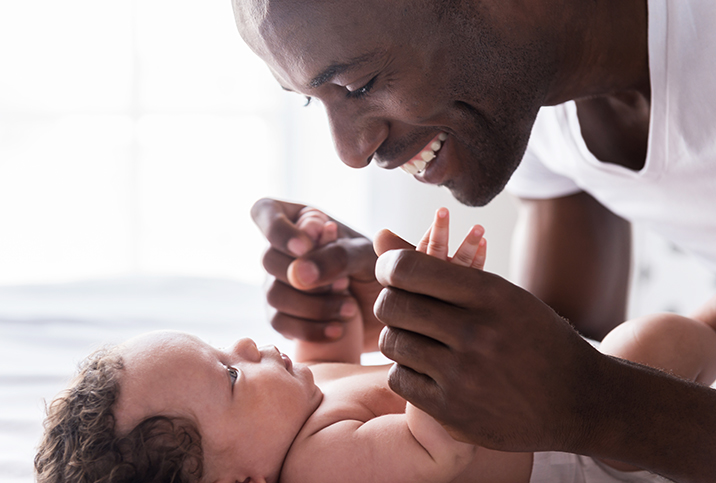Mom’s Not the Only One at Risk for Postpartum Depression

The Catch-22 of toxic masculinity is its enforcers are often its victims. Folks presenting as male are casually denied the emotional experience of their own lives all the time. Consider how much attention goes to the bride’s "big day" than the experience of the groom.
Perhaps the phrase "male postpartum depression" was met internally with a mental nuh-uh. Women are most commonly portrayed as the casualty of postpartum depression, but repressed men experience their own untold suffering. The shortcomings of male stoicism are most present in the issue of paternal postpartum depression (PPPD).
Before we move on, let’s acknowledge the heteronormativity underlying this topic. It doesn’t take a man and a woman to make a set of parents. In a lesbian partnership, if one partner gives birth and the other does not, the non-birthing parent may still feel postpartum effects. The same goes for new families with two fathers. However your family shares these caregiving roles is the exact right way to love, regardless of sex.
If you're a new dad
Take stock of your emotions without judging yourself for feeling this way. You aren’t weak for having negative emotions nor should you feel guilty for making this "about you." If you haven’t bonded with the baby yet, that doesn’t mean you won’t. As long as you genuinely want to love the baby, you eventually will. Feelings of anxiety are natural with the coming of a child, but if nothing brings you comfort or reassurance, the issue might be more serious. Men typically respond to PPPD with agitation and anger that leads to apathy and checking out, so now is always the best time to confront the problem.
This new period in your life may not feel as rosy as it was made out to be but not because you lack what it takes to be a good dad. Have you been fantasizing about escapist measures—substance use, extramarital affairs, or simply reverting to the life you had before the baby was born? Remember that everyone is entitled to thoughts; guilting yourself for having them will only make your suffering worse. Any of the aforementioned outlets may offer an illusory sense of instant gratification, but the problem you’re trying to escape will get only worse the longer you avoid it.
If you’re having difficulty communicating your experience to your partner, the Pacific Post Partum Support Society has a hotline to call at 855-255-7999 or text at 604-255-7999. The Substance Abuse and Mental Health Services Administration (SAMHSA) also has a hotline at 1-800-662-HELP.
If you’re the partner of a new dad
Let dad help. Whether it’s letting him soothe the baby (even if it takes a bit longer than if you handled it) or involving him in feeding, he needs to feel needed. If dad offers to give you the day off and take the baby out for a few hours, let him. It can be difficult to ignore the desire to micromanage when he takes care of your child in a way different than you would, but he needs to discover his own parenting techniques. Different isn’t wrong. Perhaps it’s stress-inducing to let the baby out of your sight, but they are safe with your partner and a little rest only prepares you to be a better mother.
Logistics aid in empowering your partner. If his job offers paternity leave, plan for that and utilize it. If you interview doulas, notice if they include him in the conversation. Encourage him to attend any classes and appointments, even if a breastfeeding course seems as if it only requires the mother present. If his physical presence isn’t possible, then a picture or video texted to your partner can mean a lot, despite the extra effort being slightly annoying at the moment. If this is your first child, there is unprecedented stress on both of you, but keep in mind he’s as much in this as you are and probably spent the pregnancy feeling fairly useless.
If you’re the friend of a new dad
If your friendship wained a little during pregnancy, now is the time to check up on how things are going. And don’t just ask after the baby and mom. Focus on how he feels, too. If he doesn’t have time for you because he’s busy with the baby, that’s great, but make sure he knows you're there for him—you never know if he needs someone to talk with who’s outside of his family situation. Make sure he knows that could be you.
About 8-10 percent of fathers experience PPPD in the first six months of their child’s life. Soon enough, this unhappy time becomes a distant memory. For those of us outside the situation: If we want to better our society and encourage dads to show up for their babies, we have to offer space and support to undo emotionally constricting beliefs.

















